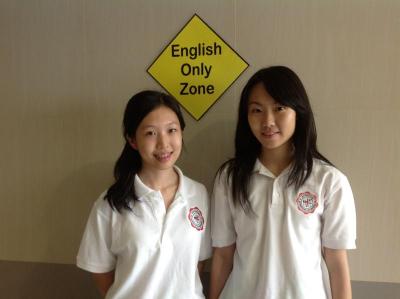
NARAK DHANAJIVITPhoto: Tanyawan (right); Ayaka (left)Two Thai students had topped the world and country in Chinese and English respectively as second languages in the latest Cambridge International Examinations (CIE).While Thailand is advancing towards a formation of the Asean Community in 2015, a fact that second languages, especially English, are still a fatal weak point of most Thai students have been haunting Thailand's educational system for years, although we have gone through many educational policies and reforms.But it does not mean they all failed. Ayaka Sato and Tanyawan Chaidarun, students of Prasarnmit Demonstration School (Secondary) in International Programme prove it well.Ayaka Sato, a 17 year-old Thai-Japanese student, had got 100 full scores or the world's top score in Chinese as a second language in the CIE’s International General Certificate of Secondary Education (IGCSE), which was the world international qualification for students and recognised by leading universities and employers worldwide.“I am surprised with the score,” said the Year 12 student.She reminded that she was interesting in Chinese and had spent two years to learn it from zero and prepared for the examination by doing the previous tests dated back around ten years."It is not that you invest a lot of time in studying, but the key is making your best out of your limited time. I believe that everyone is born with the same level of intelligence and what makes difference is that you need to work hard. Never think that you cannot."Not only time management, she told that learning style was also importance. Some people learned by reading, writing or other ways else. As for Ayaka, she chose to learn Chinese by writing; the most effective way for her to remember all of those complicated alphabets and meanings.She told that she once failed to get good grades during a primary class, even though she had read a lot of books around the clock.“Later, I recover that Thai students have learned a lot but they do not gain good grades. So, we have to concentrate on studying, not only reading tonnes of books. And my parents pay for sending me to study in the International Programme, so I want to repay them by doing the best,” she said.Another one was 16-year-old Tanyawan Chaidarun. She got the top-in-country IGCSE exam or 92 scores in English as the second language.She started learning English before enrolling in the first grade and continued a primary school on an exchange programme in the United States. That can be counted as a good, lucky start.Although she had got advantages, it did not mean she could earn the achievement like a piece of cake.“I am surprised as I never thought of it. I just try to get a good grade,” she answered with the American-English accent.Asked what the most difficult part to learn English, she said “The vocabs. There are a lot of vocabularies and the spelling is quite hard.“Thai students should practice speaking a lot more because once you can speak, you will be able to write and listen better. You have got to practice outside the classroom when you get home. Just try to talk in English to many people as you can,” said Tanyawan who was also studying in Year 12.Both of them participated in the IGCSE examination during May-June, organised by British Council Thailand, and students from over 170 countries took the exam every year.Apart from the potential of learners, teachers and educational school system were a fundamental structure for all academic achievements which will sustain the knowledge to reach the top.Mr Grant Larter, head of SPIP Faculty, pointed out that learners had to do a lot of their own work to study foreign language.He said that Ayaka was a good example. Besides her hardworking Chinese teacher, she also had done a lot of her own hard work to learn Chinese, such as, recording the lessons and listen to Chinese accents. Therefore, she was able to get full score and top in the world in a very short time.“You have to do a lot of your own work. You have to listen to it, you have to try to read it and you have to practice. Schools should go for English policies to force students to speak. That is the way it is going to be improved,” he said.“English is probably one of the world languages ever and there have so many different meanings to different things. That is most challenging thing. So, we put the language policy here and force them to speak and they kind of finding that a little bit challenge not to make mistake and stupid. Unfortunately, learning will happen by making mistake,” he said.Both of them would encourage other students to look at their achievements and everybody can do it, Mr Larter added.---------------------END------------------- Published caption Ayaka Sato, left, and Tanyawan Chaidarun, two students of Satit Prasarnmit Demonstration School’s international programme, won the top scores in Chinese and English respectively in the latest Cambridge International Examinations (CIE). LAMPHAI INTATHEP
|